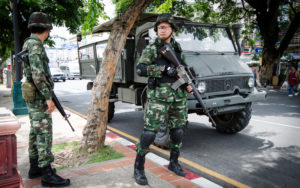Thailand Approves Military-backed Constitution in National Referendum
 Over 27 million voters turned out to polls throughout Thailand to vote on a proposed military-backed constitution in early August, marking the country’s first vote in over two years. The Straits Times reported that 61 percent of Thai voters supported the new constitution, which the current regime claims will curb corruption and put an end to political instability.
Over 27 million voters turned out to polls throughout Thailand to vote on a proposed military-backed constitution in early August, marking the country’s first vote in over two years. The Straits Times reported that 61 percent of Thai voters supported the new constitution, which the current regime claims will curb corruption and put an end to political instability.
The new draft constitution ensures that the current interim regime, the National Council of Peace and Order (NCPO), will have the power to appoint nearly all 250 members of the Senate. The provision entrenches military power within the legislature for the next five years, according to The Straits Times. The draft also enables the military-appointed Senate to join members of parliament in selecting a non-elected prime minister. With these and other provisions, the regime hopes to use the country’s 20th constitution to make it extremely difficult for any single political party to dominate the future government.
The referendum decision comes weeks after the NCPO—the strictest regime the country has seen since the early 1970s— has continued to clamp down on opposition, banning rallies and arresting dozens of political dissidents. Human rights groups worldwide condemned the regime for its actions leading up to the vote and for its Referendum Act, which made criticism of the constitution punishable by up to 10 years in prison.
The regime’s heavy-handed oppression brought into question the legitimacy of the vote, a sentiment that was further validated by the tight restrictions on available public information on the constitution prior to the referendum and by the low voter turnout. The Guardian reports only 55 percent of eligible voters came out for the ballot, compared to the forecasted 80 percent.
Critics of the new constitution include Thailand-based academic Paul Chambers, who believes the draft constitution “expands military and judicial power at the expense of democracy.” Democrat Party leader and former Thai prime minister Abhisit Vejjajiva also criticized the draft constitution, stating, "I will not accept it because it does not solve the country's problems nor offer permanent rules to help Thailand to move away from its current condition."
However, supporters of the charter believe that the constitution will put a stop to a decade of violent turmoil and political fragmentation within the country. An E-Saan poll conducted in Northeastern Thailand revealed that voters supported the draft primarily because they wanted a return to peace and an election to be held as soon as possible, as well as a more effective check and balance system against corrupt politicians.
A few days after the vote, Prime Minister Prayut Chan-o-cha also sought to diminish concerns that the regime would delay a return to democracy by announcing that general elections would be held in November of 2017.
But amid the regime’s claims of attaining greater stability, thirteen bombing incidents struck the country in the weeks following the “yes” vote. The attacks occurred throughout tourist resorts in the predominantly Muslim Deep South, a region where video clips stating that Muslims would not be treated fairly under the constitution had previously circulated.
Investigations into the bombings remain underway, but conflicting responses to the attacks mirror the divided state of the country prior to the referendum. Government and political parties suggested that the bombing attacks were undertaken by those who rejected the constitution, but were quickly met with condemnation from an anti-government group, United Front for Democracy Against Dictatorship, which criticized the government for scapegoating.
Though the motives behind the bombings remain uncertain, the attacks and the responses they provoke seem to signal that current promises of peace, stability, and national unity for Thailand continue to remain far out of reach.
